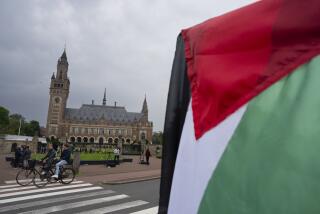Nicaragua Devalues Currency, Angering Public
Nicaragua’s two-day-old government slashed the value of the national currency in half Friday in an effort to patch up the battered economy, but it left angry consumers with wads of virtually worthless bank notes.
Prices shot up accordingly, but the wages of most Nicaraguans, many of whom earned the equivalent of $30 a month before the devaluation, did not.
At the new prices, a pound of rice, one of beans and one of beef cost a total of 205,000 cordobas, or $1.46.
A new 1-million cordoba note, worth $7.14 at the parallel exchange rate used by most Nicaraguans, appeared Friday. A 500,000 cordoba note was also put into circulation.
The exchange rate of the cordoba went from 70,800 to 140,000 per U.S. dollar in the parallel market, a 49.5% devaluation.
The parallel market provides dollars for most imports.
The devaluation was a blow to Nicaraguans who buy dollars to import goods. But that was the idea: to make it more expensive to import goods and cheaper to export Nicaraguan products.
President Violeta Barrios de Chamorro took office Wednesday, inheriting an economy flattened by more than a decade of mismanagement by the leftist Sandinistas, war with the U.S.-backed Contras and a U.S. trade embargo, since lifted.
The unpopular devaluation was an austerity measure that will squeeze impoverished Nicaraguans even harder in the short term.
In another development, the Organization of American States began providing food to the Contras, although the fighters say they will keep their weapons until the Sandinistas leave the military.
The rebels were balking at disarming as pledged by June 10, citing fears of retaliation by Sandinistas who remain at their posts in the police and armed forces.
One OAS official said that the organization fears the rebels would resort to “felonies” if they go hungry.
More to Read
Start your day right
Sign up for Essential California for news, features and recommendations from the L.A. Times and beyond in your inbox six days a week.
You may occasionally receive promotional content from the Los Angeles Times.






